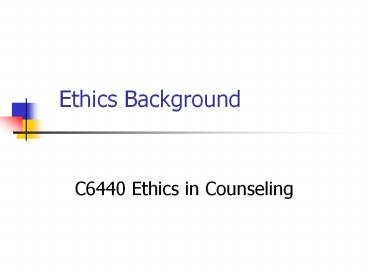Ethics Background PowerPoint PPT Presentation
1 / 20
Title: Ethics Background
1
Ethics Background
- C6440 Ethics in Counseling
2
Ethics as Ground Rules of Behavior
- Major Theories
- Utilitarianism Goal-base
- Deontological Duty-based
- Contractarian Rights-based
- Virtue Theory Character-based
3
Consequential Goal-based
- Focuses on the consequences of human actions
- All actions are evaluated-if achieve desirable
goal - Concepts of right, wrong duty are subordinated
by end or purpose of action - Teleological-end or purpose
- Consequentialism-right action must maximize the
good for all - Utilitarianism-an action is right if it produces
greatest balance of pleasure or
happiness-happiness most desired thing
4
Deontological Duty-based
- Deontological-duty-what is important are rules
principals that guide action - it is impossible to conceive anything at all in
the worldwhich can be taken as good without
qualifications except a good will (Kant, 1948) - Only things good are actions of will freely
motivated for right reasons - Reason is faculty that aids discovery of correct
moral principals - When reason guides will-resulting actions are
done from duty
5
Deontological Duty-based
- Acts are good because they are done for sake of
what is right not because of consequences they
might produce - Duty is linked to universal principals that
should govern all our actions - Categorical Imperative actions are based on
principals around which one would hope all people
would live-everyone has intrinsic value
6
Contractarian Rights-based
- Social Contract
- State of Nature-Locke-Everyone has inherent
rights which they are born with - Veil of Ignorance-Rawls-persons would choose
principals fair to all
7
Application of Deontological Contractarian
Approach
- Are rules fair to everyone?
- Do rules hold universally even with passage of
time? - Is every person treated with equal respect?
8
Virtue Theory Character-based
- Focus on persons underlying moral character
- Wisdom, generosity self-restraint - good member
of community - Moral Virtue-Aristotle-development of virtue
requires cultivation of good habits based on good
upbringing good education
9
Individual and Group Ethics
- Understanding, acceptance, and application of
ethics are important to individuals groups of
individuals - Ground rules application is a manifestation of
ethics - Morals
- Values
- Virtues, etc.
10
Truthfulness Kants Concept
- Truth must be principal factor for social
intercourse - Liars destroy fellowship-lying makes it
impossible to derive benefit from conversation - Secrets are permitted may be kept, not by lying
but by non-committal statements - Silence or extreme talkativeness reveal pride in
a person - False speaking is always a lie
- Equivocation ok as long as not give false
impression - Right of Privacy right not to be watched if
lying
11
The Role of Perception in Ethical Development 1
- Perception is a source for development of one's
ground rules - Skills needed in selecting, organizing,
interpreting, acting on information - Sense of perception increasingly challenged, as
information is created and exchanged in volumes
velocities unprecedented in human history
12
The Role of Perception in Ethical Development 2
- Ethics formation driven significantly, not
exclusively, by personal perception rather than
elements of fact or reality - Previous experiences drive reactions to present
situations, even though we know they are cannot
be identical. - Numerous views of the "truth" exist for the same
reality situation--hence our diversity
13
Cultural Relativism
- Different cultures have different moral codes
- What is thought to be the right by one group
could be quite abhorrent to another group - There is no objective standard that can be used
to judge one social code better than another - The moral code of our society has no special
status merely one among many - There are no universal truths
- Moral code of a society determines what is right
within that society - It is arrogance for us to judge conduct of others
14
Eskimos Example of Cultural Relativism
- Show hospitality by offering wife for evening of
sexual pleasures - Women are free to leave their husbands go to a
new partner - Female babies are often killed
- Old people are left out in snow to die when they
are not able to care for themselves
15
Arguments for Cultural Relativism
- Different cultures have different moral codes
- Rights wrongs are a matter of opinion that
changes from culture to culture
16
Literal Application of Cultural Relativism Would
Lead to
- We could no longer say customs of other societies
are morally inferior to ours - We would not criticize actions that differ from
our culturally accepted one - We would determine right or wrong of action by if
in accordance with specific society - Moral progress would be called into doubt
- We would not look to improve because we have to
assume the current rule is morally correct
17
What Contributes to Cultures Differences
- Religious factors
- Physical circumstances
- Life often forces certain choices
18
All Cultures Share Common Values
- Telling the truth
- There are many common rules which must exist
will not vary from society to society- Can you
name a few?
19
What Lessons Do We Learn from Cultural Relativism
- We cannot assume our preferences are based on
some absolute rational standard - We must keep an open mind
20
Kohlberg's Stages of Moral Reasoning
- Obedience Punishment - avoid punishment
- Marketplace - reciprocity,fairness sharing
- Good Boy Nice Girl - approval by others
- Law Order - morally correct behavior
- Social Contract - societal agreed upon right
actions - Universal Ethical Principal - dignity of human
beings as individuals

